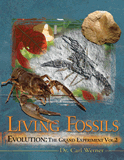
Human Jawbone Found: Doesn’t Fit Evolutionary Steps
National Geographic News: “Oldest Modern Human Outside of Africa Found” Experts in the ever-changing topic of human evolution thought they had most of it figured out—when our ancestors left Africa, the major evolutionary steps since then, etc. But a human jawbone discovered in China just doesn’t fit.
The jaw was found in 2007 in Zhiren Cave in the south of China, and its “prominent” chin led researchers to believe it was from a relatively modern human. The problem is that the fossil has been dated at far older than it “should” be, according to existing theories. In fact, at an estimated 100,000 years old, the bone is 60,000 years older than any other Homo sapiens remains in China—and 40,000 years older than the date when modern humans left Africa (according to evolutionary scientists).
The fossil has been dated at far older than it “should” be, according to existing theories.
Moreover—and of particular relevance to creationists—is that the find indicates that ancient H. sapiens may have been “mingling—and possibly even interbreeding—with other human species for 50,000 or 60,000 years.” For that matter, one researcher notes that the jawbone is “within the range” of Neanderthal chins. (Neanderthals are sometimes classified as a subset of H. sapiens and sometimes classified separately.)
The discovery wins two points for creationist views on human origins. First, it strikes a blow against the idea that multiple tracks of evidence align neatly in favor of the evolutionary view. Not only does the Zhiren find go against old-age interpretations of archaeological evidence, but it also contradicts old-age interpretations of existing genetic evidence. Yet the date for the Zhiren bone is “solid,” one anthropologist pointed out.
Second, the find indicates that the history of humanity cannot be easily divided into separate species living (largely) separate lives at separate times. The evidence is that multiple groups of humans now claimed to be separate species (on the basis of minor anatomical differences and old-earth dating techniques) actually lived alongside one another and intermingled, all fully humans made in the image of God.
For more information:
Remember, if you see a news story that might merit some attention, let us know about it! (Note: if the story originates from the Associated Press, Fox News, MSNBC, the New York Times, or another major national media outlet, we will most likely have already heard about it.) And thanks to all of our readers who have submitted great news tips to us.
(Please note that links will take you directly to the source. Answers in Genesis is not responsible for content on the websites to which we refer. For more information, please see our Privacy Policy.)
Recommended Resources

Answers in Genesis is an apologetics ministry, dedicated to helping Christians defend their faith and proclaim the good news of Jesus Christ.
- Customer Service 800.778.3390
- Available Monday–Friday | 9 AM–5 PM ET
- © 2025 Answers in Genesis





